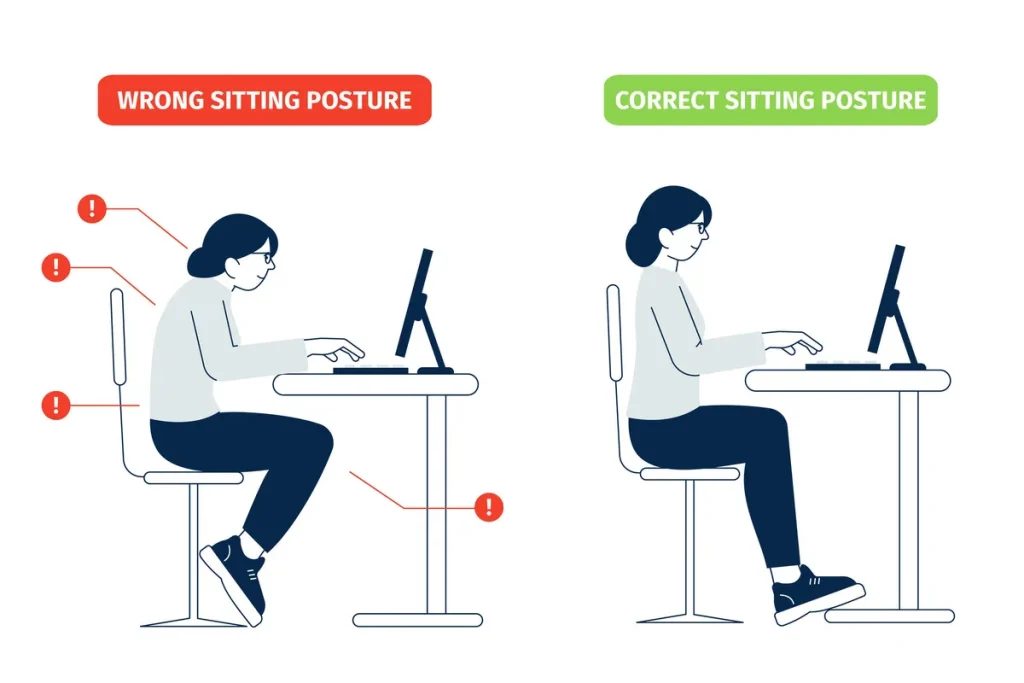This One Daily Habit Is Wrecking Your Health. Here’s What to Do Instead
Sitting all day can be detrimental to your health. Here's how to combat its effects.

Most people are concerned about maintaining their health; the challenge lies in becoming motivated. It might be difficult to find a strong enough reason to force yourself to get out of your seat and move when you detest exercising.
It turns out that getting up is just as crucial as the actual activity. And the reason for that is that every one of our lives has a sneaky health risk. Ready to hear it now? This is not something you’ll want to see while seated.
The main problem here is actually excessive sitting. We get to spend a lot more time sitting down than we did in the past as the world gets more modern and digitalized. An mounting body of research indicates that sitting has negative effects on our health. Although it may be somewhat dramatic to refer to it as the new smoking, it does negatively impact several significant health aspects. Let’s investigate more closely. (For other health advice, check out these three methods for determining your blood type and how to hack happiness.)
How sitting affects your body

An excessive amount of sitting indicates a sedentary lifestyle, according to specialists. And that has detrimental effects on your health. Studies reveal that those who spend long hours sitting down are more likely to:
- Heart disease
- Certain types of cancer
- Type 2 diabetes
- Vascular health issues, like blood clots
- Poor circulation
- Muscle pain, stiffening or weakness, including back pain
- Slowed metabolism
Put another way, the likelihood of dealing with some of the major barriers to longevity and quality of life increases with increased sitting. Staying in one place all the time overuses certain muscles and underuses others, which over time can result in strains, cramps, or weakness. Additionally, it slows blood flow and metabolism, which makes it more difficult for the body to control blood pressure, blood sugar, and other bodily functions.
This implies that sitting can exacerbate your physical symptoms on a daily basis, even in the unlikely event that you receive a catastrophic diagnosis. Furthermore, excessive sitting can have a detrimental effect on your mental and even physical health. According to Yale Medicine, sitting has been connected to dementia and depression.
To bring this all home, a number of studies have discovered a link between excessive sitting and a greater total mortality, or death from all causes. This could be as a result of the direct negative effects sitting has on health or because sedentary lifestyles are linked to other unhealthy behaviors.
In summary, there is growing evidence that excessive sitting is detrimental to our health when it comes to our sedentary lifestyles.
Four ways to reduce the effects of sitting all day
Perhaps there’s nothing you can do but sit a lot. You should be aware that you have options whether you have a desk job or a disability that requires you to sit for extended periods of time. The actions you take (very literally) can significantly alter the risks to your health that you are sitting with.
1. Sit less (if you can)
To begin with, attempt to sit less all around if you can physically manage it. This may be turning off a TV show and going for a walk while listening to a podcast or raising your laptop or monitor so you can stand while working.
Consider where you sit most of the time—at work, at home, or somewhere else. Next, try finding new methods to stand up for yourself. If you spend most of your time on the sofa when you’re at home, think about cooking more elaborate meals or picking up an energetic pastime. The extra time spent moving about will help a lot.
2. Break up your sitting
When you do sit, try to avoid sitting for extended periods of time at a time. The results of one study suggest that you should try to get up every thirty minutes and take three minutes to move your body. To reset your body and relieve some of the strains associated with sitting, even a little fifteen steps can make a big difference. But the more exercise you get during the day, the better.
As the Karolinska Institute professor who oversaw the study, Dr. Erik Nastlünd, said to the New York Times, it could be beneficial to set a timer for thirty minutes each time you’re at your desk. This can help you focus in addition to acting as a reminder to get up. According to research, a person can concentrate on a single task for anywhere between 10 and 52 minutes. By taking pauses every thirty minutes, you’re operating in the optimal range. You’ll be more driven to stay focused and do more work during sitting sessions if you know the timer is going.
It’s beneficial to have activities you enjoy doing to motivate yourself to get up from sitting too much. If it’s feasible, you could:
- Make it a habit to walk while you take phone calls
- Use a smaller water glass/bottle and coffee cup so you have to get up for refills more often
- Take the stairs instead of the elevator
- If you take the train or the bus, choose to stand (you’ll free up a seat for someone who might need it)
- Use your lunch break to talk a walk (you’ll get the added benefit of vitamin D)
- Walk from one end of your house/apartment to the other between every episode of TV
3. Get frequent exercise
Every weekday, make it a point to move for at least 30 minutes. While it won’t totally reverse the health problems associated with sitting, regular exercise can help mitigate them. According to official recommendations, the US Department of Health and Human Services suggests doing two or more days of strength training in addition to at least 150 minutes of moderate aerobic exercise or 75 minutes of intense cardiovascular exercise every week.
4. Adopt the proper posture
Lastly, when you do sit, be sure your posture doesn’t strain your body excessively. The ideal way to sit is as follows:
- Lets you rest your feet flat on the floor with your knees bent 90 degrees
- Keeps your neck straight (you might need to elevate your computer monitor for this)
- Helps your shoulders relax (you might want armrests on your chair, for example)
- Lets you type or write with your elbows at a 90-degree angle and your wrists supported
Additional support for the lumbar spine—basically, your lower back—might also be beneficial for certain individuals. To keep your spine’s natural curve, you might purchase a pillow to place in your chair.

In the end, your general health is directly impacted by how much you sit. This is not to argue that you can never have a carefree day spent relaxing at home. To make sure you’re not sitting too much, it’s important to assess how often and for how long you sit.
See our guide to obtaining a decent workout at home and the seven best workouts for complete beginners for more wellness ideas. Here are the top five exercises for heart health as well.




